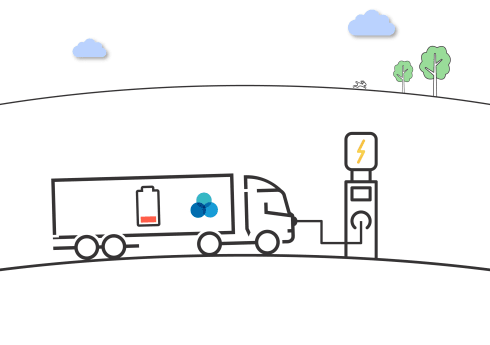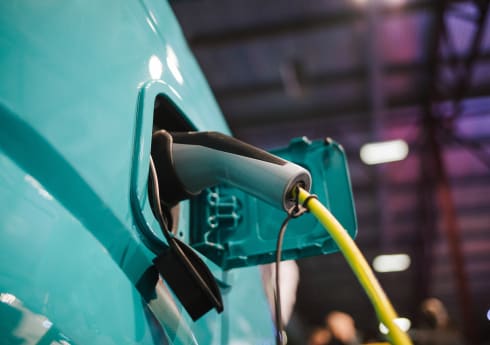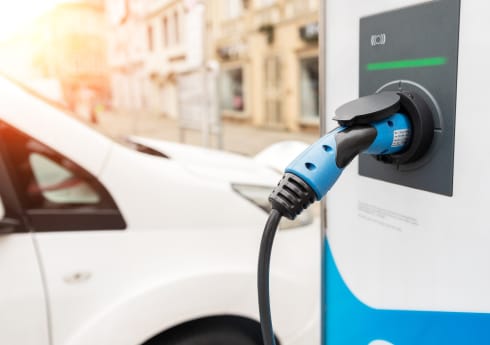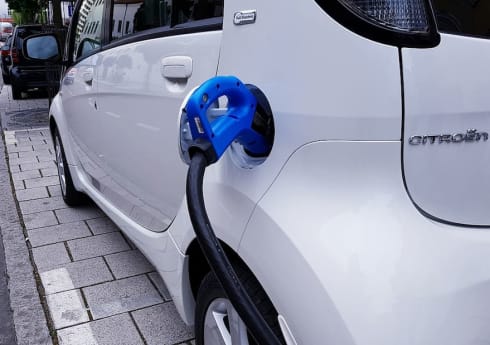The Complete Guide To Business EV Charging
We’re getting closer and closer to net-zero goals. But what does that mean for business EV charging? Government grants are available for workplace charge points and charge cards can help you keep an eye on your costs.
We’re breaking down all the details here. Find out everything you need to know about the different EV charging stations for businesses, charge cards, and how to make the most of the green future below.

The different types of EV charging stations for businesses
Most charging points are available in three different speeds. Rapid charge points are the fastest and can fully charge an electric vehicle in 40 minutes or less. We recommend businesses invest in fast or or rapid stations to speed up their charging times.
- Standard charge points: around 3-7kwh. These stations will charge an electric vehicle to 80% in around 6-8 hours. Also known as slow charge points, these are most often installed in homes and used to charge overnight.
- Fast charge points: 7-22kwh, fast chargers get a vehicle up to 80% in 2-4 hours. These are one of the best choices for businesses thanks to their affordability and range.
- Rapid charge points: 50kwh. Rapid charge points are the fastest of all chargers, but are the priciest to install. Having a rapid charger at work or using a public rapid charger can be a very useful part of any EV plan.
Where can you charge a business electric vehicle?

- Charge at your workplace EV stations
- Install a home charging point
- Access public EV charging points
Where you can charge up depends on what area you’re in and if your workplace has a charging station. If you have a home charging point, you can charge up at any time though it may take a few hours to get up to full.
Here’s everything you need to know about the three main types of business EV charging stations.
Workplace charging points
- Speeds: 7 – 22 kwh
- Installation cost: varies
- Grants available: up to £350 per charge point
Benefits of workplace charging points
- Receive government grants to help cover installation costs
- Pay business energy rate tariffs instead of public
- Reduce your workplace CO2 emissions
One of the most reliable business EV charging solutions is to install a charge point on your premises. Employees won’t have to use pricier public charge stations when they can simply charge at work. Plus, you get to keep an eye on employee’s energy usage and encourage low carbon travel.
How workplace charging points work
Workplace charge points are usually installed when you’ve got access to the UK government’s Workplace Charging Scheme (WCS). This covers up to £350 per charge point installed (that’s £14,000 maximum for 40 charge points). This grant is only available from recognised EV installation providers.
Once your stations are installed, you can set your prices. Employers can give employees a discount on their energy prices when they refill at work. This gives you a lot of control and flexibility over your energy costs, plus a potential benefit for your workers.
What about security? Well, out of all business EV charging point types workplace chargers are one of the most secure. If not the best! Select EV charge points that can be combined with RFID cards. Employees tap these on the charge points before they can use them. Without a card, no one else can use your charge points.
How to get workplace charge points for your business
Check that you have room to install charge points at your business. Once that’s done, select a recommended installer and get to work!
Home charging points
- Speeds: 3 – 7 kwh
- Installation cost: varies
Benefits of home charging points
- Keep your electric vehicle safe at home
- Get smart EV chargers to connect to your Wi-Fi and phone
- Link up to your home solar panels for climate friendly charging
When everyone talks about business EV charging, they often jump to installing charge points at your company premises. But employees getting home charge points has its benefits too. These points are really convenient to use and often more affordable than public charge points.
Since your car is parked at home, you don’t have to worry about security when you’re charging up at night. Plus, home charge points can be extra eco-friendly! These charge points can be linked up to your solar panels, so any energy you get can be sent into your EV.
How home charging points work
One of the big questions we get is how home charge points work for businesses. First off, you get a charge point installed at your employee’s home. Once that’s done, you can set up the charger with a key or RFID so only your employee can use it.
With smart EV chargers and fleet management software, you can track the charging times of your company EVs even for home charging.
These smart EV charging stations for businesses can be used with an app. The apps come with lots of features like stopping charging during peak times and checking your energy usage remotely.
Public EV charging points
- Speeds: 3 – 50 kwh
- Cost of usage: varies
Benefits of public charging points
- There when you need them most
- Extra revenue stream for your business
- Bring in climate conscious customers
Because of public fees, only using public EV charging points can work out to be more expensive than using a home or workplace charge point. For businesses and employees, they shouldn’t be the foundation of your charging strategy for this reason.
But they have a place. There are now over 42,000 public charging points in the UK! Longer journeys no longer run the risk of drivers being stranded without charge, especially as the range of EVs has increased. See our guide to EV range anxiety for further details.
Getting an EV charge card or smartphone app to pay at public networks can help you save some cash, especially if you stick to the same network.
How public charging points work
It depends on the charge point. Public charge points work in four ways:
- Contactless payment: tap your debit or credit card to pay
- Tap the app: use a smartphone app to access the charge point
- Plug in: simply plug in your electric vehicle and charge up
- RFID card: tap your charge card to access the charge point
Most businesses prefer to use or install RFID card types. With these two, you have some control over who can use your charge points. The smartphone app types limit it to those that sign up for the app, while contactless and plug in types can be used by anyone.
Employees can use public charge points when they’re away from the office and need to charge up. This can be an important part of your EV strategy if your employees are often on the go.
Commercial public EV charge points
Businesses can also install public charge points and set energy prices to get extra revenue off the charger itself and the increased footfall. For example, hotels and coffee shops benefit from slow chargers that encourage the user to stick around a bit longer to charge their EV.
Should you get EV charge cards?
- Help with journey planning
- Access a network of charge points
- Get electric, petrol and diesel fuel usage in one card
EV charge cards are a clever solution to a problem many businesses face as the switch to EV flickers on. Where are your charge points and how do you stay on top of your energy usage?
Just like business fuel cards, charge cards give you invoices for your electricity usage as you charge up. Combine with EV charging stations for businesses to easily keep an eye on how much energy your employees and customers are using.
Plus, some public charge points are only available with the right card or app. Using a charge card lets you pick which networks you want to jump into. They often come with a smartphone app or website to help you find your nearest charge points, which is important to help plan your journeys.
How to make the most of business EV charging
Getting workplace charge points plus charge cards is all well and good. But you’ll benefit the most when you get efficient EVs and know how to use them. Here are our top tips for EV charging and driving:
- Get a long-range electric van or car to get the most out of your battery. You won’t have to charge up as much!
- Don’t forget the regen braking feature. Most EVs regain battery when you brake or decelerate. This makes EVs last longer in the city.
- Use a charge card with transparent electric prices, so you know how much you’ll be spending when you charge up.
- Consider hiring an electric vehicle that has an eco-driving mode. Just like a battery saving mode on your phone, this mode helps your EV last even longer.
- Use the heated seat in winter instead of heating up the whole vehicle to save on battery.



